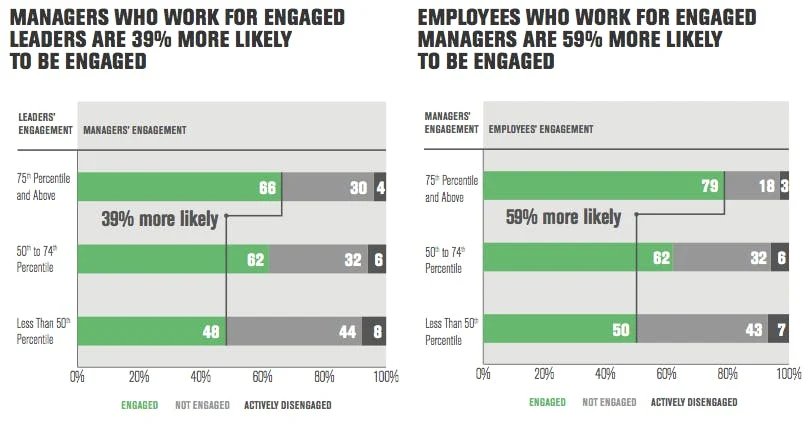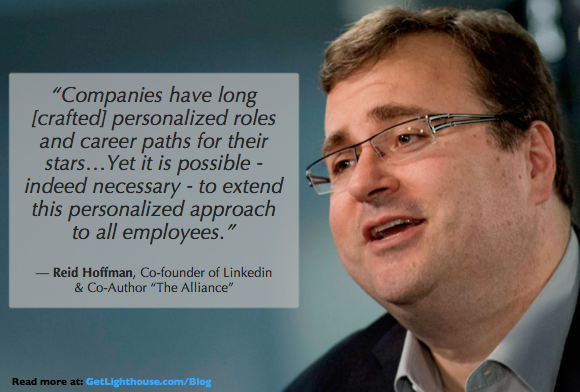Let's face it — hiring the wrong manager can be an absolute nightmare. Not only does it drain your team's productivity and morale, but it also takes a serious hit on your bottom line. The United States Department of Labor estimates that making a poor hiring decision can cost you nearly a third of that employee's first-year salary.
And it gets even worse. Teams led by highly engaged managers see employee engagement levels almost 60% higher compared to those with disengaged bosses, according to Gallup’s research on what they call the “Cascade Effect.” That's a massive difference in performance and job satisfaction, all because of the manager you hired.

Unfortunately, most of us aren’t particularly good at picking the right leaders. Gallup’s research also show that 82% of companies fail to select the ideal candidate when filling managerial roles, despite their best efforts.
The truth is, finding the right manager for your team is one of the most critical decisions you can make as a business leader.
A great manager can inspire, motivate, and lead your team to new heights, while a bad leader can quickly create a toxic environment and drive your best teammates to leave.
But don't worry, we’re here to help you.
In today’s post, we'll share a collection of the best interview questions to ask manager candidates. With these questions in your arsenal, you'll be able to separate the wheat from the chaff and hire managers who will truly take your team to the next level.
Types of interview questions to ask manager candidates we will cover:
- Start your Management Interviews with Good Screening Questions
- Learn How Your Candidates Solve Problems and Make Decisions
- Discover their Experience and Skills + how they fit your open role
- Remember to Ask Your Manager Candidates How They Develop Their Team Members
- Find out if they’re a cultural fit
Start your Management Interviews with Good Screening Questions
When you're interviewing candidates for a management role, it's best to start with easy questions that both warm up your candidate, and make it easy to disqualify obvious non-fits.
These first few questions you ask help you get a sense of your candidate's background, goals, and self-awareness. You’ll get a baseline understanding of who they are and how they think about the role of a manager.
From here, you can decide if you want to go deeper, or they would not fit your culture of leadership.
[Ed note: Each question includes a brief explanation, so that you know why it’s a great question and how to use it.]

Screening questions for your management interview
1) How would you describe your management style?
- Good leaders can describe their approach to management, and will be excited to get the chance to talk about it with you.
2) How do you motivate your team and keep them engaged?
- One of the best ways to make sure their approaches match your leadership style is to find out their philosophy on engagement and motivation (or if they even care at all!)
3) How do you handle conflicts within your team? Can you share an example of how you resolved a conflict?
- No team is perfect. Knowing your managers can help resolve conflicts well is an important skill to ensure they have in their tool kit.
4) Why are you interested in this role at our company?
- The best culture fits are interested in your company specifically, and can clearly articulate why. A generic answer here tells you they may not have their heart in it.
For the right candidate, they’ll be excited to answer these questions, and you’ll start to build rapport with them, too. This is how you start a job interview process off on the right foot, and save yourself a lot of time if they’re clearly philosophically different in their approach to leadership.

Learn How Your Candidates Solve Problems and Make Decisions
Asking your management candidates about their problem-solving and decision-making processes is crucial for understanding how they’ll help your team when things get hard.
These questions show you how they approach challenging situations, and help create good outcomes. You can also learn how creative and strategic they are, which is crucial for adapting to our ever changing market and workplaces.
By learning about their problem-solving and decision-making skills, you can make sure you hire a manager who will not only be competent, but also a great fit to help your organization grow no matter what challenges you face in the future.
Problem-solving questions to ask manager candidates
5) Can you give an example of a challenging problem you solved in your previous role?
- What they choose can be as interesting to learn as how they solved it.
6) Can you describe a decision you made that was unpopular and how you handled it?
- Every leader faces controversial decisions. Being able to talk about them confidently and recognize when others disagree can show you if they are an empathetic leader.
7) How do you approach problem-solving? Who do you involve in decisions and how do you balance speed and quality?
- Every culture is different, so it’s important to understand if their approach is in line with your company’s culture.
8) When was a time you had to learn something new quickly to succeed in your job? How did you approach it?
- Especially if your company is in a different industry than they previously worked, it’s important to understand how they would approach coming up to speed. You also want to look for signs they have a growth mindset.
These are great behavioral interview questions that start to get to the heart of how your candidate works as a manager.
While we are suggesting generalized questions about problem solving, you can learn even more helpful insights if you mix in a question or two related to problems you specifically have today. That will then reveal if you think they have the ability and experience to make an impact where it matters most to you.

Discover their Experience and Skills + how they fit your open role
Not all management roles are created equal. In fact, they can vary quite a bit.
Just because someone was a successful leader at one company does not mean they will work well at your company. That’s why it’s important to spend time learning the skills and experience they have.
Now, they don’t need to be a perfect 100% match, but you should realize that if they have absolutely no experience, or their experience feels foreign to what you need them to do, then you probably shouldn’t hire them.
That’s why a significant portion of your interview should be spent asking questions that dive into the key responsibilities they've had in prior roles, and what they accomplished. This can also be really useful if you get to the offer stage and do reference checks; you can make sure what they described is reality according to others they worked with.
Questions to Ask a Potential Manager About Their Experience
9) Can you walk me through your experience at [Company X] and how you [Bullet Accomplishment Y]?
- Take a minute to review their resume and ask them to describe more about a bullet that you’d like to learn more about. Pick something that looks related to what you’re hiring them for.
10) Which of your prior experiences do you think is most relevant to our open role? What about it do you feel is most relevant/best prepares you?
- Just as you tried to match the role to experience you see on their resume, it’s great to turn it the other way and see what they think matches best.
11) What tools and approaches do you think are most important for a team like the one we’re considering you for?
- Learning the tactics and tools they use can help see how well they align with how your company operates. They might also inspire some new things for you to try.
12) How have your approaches and strategies as a leader changed over time? What motivated those changes?
- Part of leadership is adapting to new challenges and being willing to learn and change. Understanding how they’ve changed and why can reveal a lot about how they think and work.
These sorts of questions are a deeper way to ask about their experience. They’re not generic (“tell me about a time…”) questions.
Instead, they show your candidates you took the time to prep a bit, and aren’t just asking them to read you their resume (which happens all too often). You also give them the chance to show how they’ve grown and changed over time, which is then a pretty good predictor of whether they will grow and change at your company.

Remember to Ask Your Manager Candidates How They Develop Their Team Members
We preach it on the Lighthouse blog often: developing and growing your team members is a key responsibility of every manager. Not doing it is a key way you lose great employees who might otherwise stay and contribute for many years to come.
That’s why you absolutely have to make time to ask about this in your management interview process; you won’t know what you don’t ask, and it’s easy to make false assumptions about what a manager will and will not do.
At the same time, it’s not just about coaching and developing your teams; a manager who grows their people will also then have a firm grasp of each person's strengths and potential. That allows them to better leverage their team’s abilities to get the best results for your organization, too.
Employee development questions to ask for a manager interview
13) Can you share a time when you identified a team member's potential and helped them grow into a higher role? What steps did you take?
- It’s easy to develop someone who tells you exactly what they want to learn. Yet, true leadership is seeing the potential in others and helping them reach it.
14) What are your preferred methods for giving feedback and coaching to help your team members improve? Can you walk me through a recent example?
- Career growth isn’t just about taking courses or reading books, it’s also about day to day skill building and development. How a leader coaches their team shows you a lot about the kind of manager they’ll be at your company.
15) How do you balance the immediate needs of your team with the long-term development goals of your team members?
- This is an advanced tactic that shows the depth of their skills. A good answer will talk about things like the Water Line principle and Task Relevant Maturity as ways to know when and how to let your team members take on new challenges.
16) Can you share an example of a development plan you created for a team member? What do you think were the most important parts of it?
- Here you’re not only getting an example, but seeing how well they understand the development planning process; this will help you see if they invest in growth in ways and as much (or little) as fits the team they’re joining.
Growth is such a crucial part of the responsibilities of a manager, yet they can often get overlooked in the interview process. These 4 questions can help you quickly see how well they grasp the importance, and the accompanying tactics needed to effectively develop their team members.

Find out if they’re a cultural fit
A lot has been written over the years about culture, and too much of it has been boiled down to awkward tests like, “would I want to get a beer with them?”
Having hired quite a few people in my career across a variety of locations, backgrounds, and ages, I can tell you that culture fit has little to do with beers.
While most everyone I’ve hired has been pleasant, many of them are highly unlikely to ever get a beer with me (they don’t drink, location differences, social preferences, etc), yet there were things that were important signals about whether they were a culture fit.
The real culture fit tests are about how they work, what they need to thrive, and whether they fit how your team and company likes to operate. Those are the things that will energize or drain you and your coworkers when working with them if you hire them.
Culture fit questions to ask in your manager interviews
17) How do you celebrate accomplishments and reward great performances on your teams?
- How you praise, what you praise, and how much you praise are all key signals about whether someone is a culture fit. Look for signs they’re dramatically different from what the rest of your company would do.
18) What are your favorite tactics to boost team morale during challenging periods?
- No job is all sunshine and rainbows. Seeing how they approach difficult situations is important not just for creativity, but to recognize that we’re all a little more on edge when we’re struggling; if someone isn’t a culture fit, it will stand out more in tough times.
19) Do you prefer a more settled, senior, experienced team, or a fast paced, but junior team?
- Edit this question to create the contrast you want. The point is to see if they thrive in the exact situation they’re entering with your team, or if they prefer the opposite. Be careful hiring people that don’t want your team’s situation, or at least have a frank conversation about it before they accept your offer.
20) How do you tailor your coaching and mentoring style to suit different team members' needs and learning styles?
- Some managers are very much one-size-fits-all in their management styles. If you have a team that is mostly all the same and needs that style you’re fine, but beware hiring someone who doesn’t understand the nuance and importance of adapting your style to fit different personalities and employee types.
While “culture fit” may feel like a loaded term, it’s still important. Don’t shortchange the opportunity to make sure the philosophy, habits, and interests of your management candidate fit what you need for the role.
Final word
While it’s unlikely any candidate will be a perfect 100% cookie-cutter fit for the role you’re hiring, the interview process and the questions you ask should help you find the best fit possible.
Equally important, you can save you and your team a lot of headaches and wasted time by asking better questions throughout your interview process. This way, you can rule people out sooner, and build more confidence in the candidates that really are a great fit for your open role.
Remember that all this effort in the interview process is for a good reason: you’ll be spending many hours every week with the person you ultimately hire, and especially managers can do a lot of damage if they’re not a fit.
Take a few minutes to save some of your favorite questions you learned today and you’ll be on your way to improving both your management interview process and your ability to choose the right person to hire.
If you’d like to build more of your interviewing and hiring skills, check out these other great posts:
- Learn how to identify the often overlooked skill of "grit" in candidates — a perseverance superpower that can power them through challenges and lead to long-term success.
- Unlock the secrets to identifying high-potential employees during interviews — this guide reveals the 4 crucial traits to look for that can transform inexperienced hires into your next star performers.
- Avoid ruining your hiring efforts — this insightful guide breaks down 10 common interview mistakes that drive great candidates away (and how to fix them).





